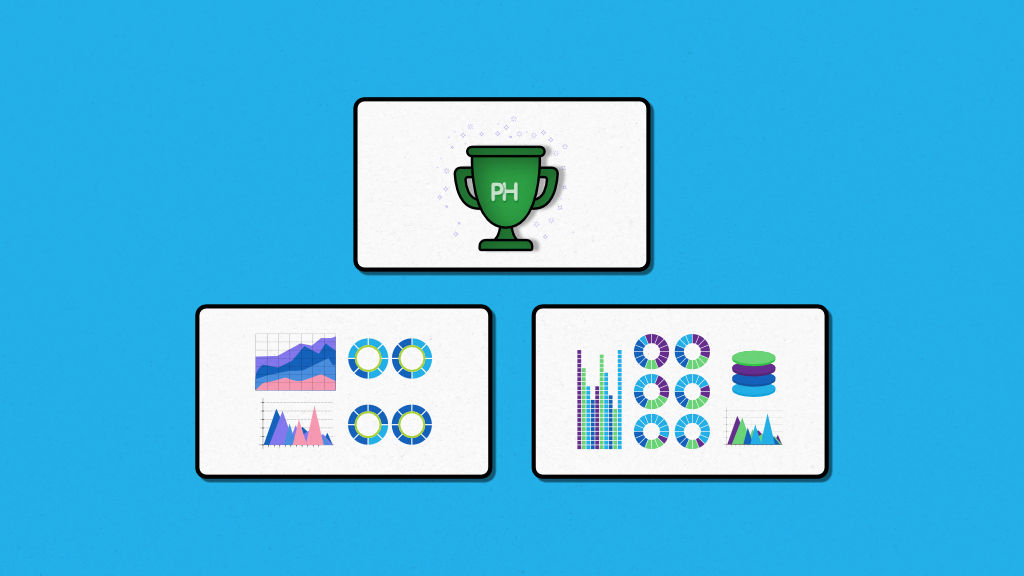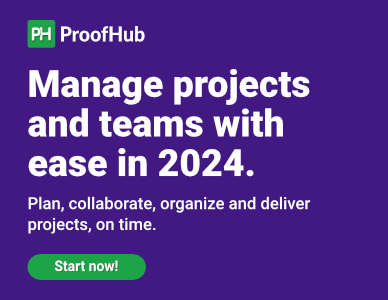For ProofHub, it’s been a great time throughout. From the launch to building new features, teams at ProofHub have been doing extraordinary things. It’s been great to see them grow and that keeps us working towards employee recognition to make our team hit several more milestones. According to research, 68% of US employees were reported either not engaged or actively disengaged. When asked how to improve engagement, 58% of professionals pointed to ‘employee recognition’.
Employee recognition is the informal or formal support of a team’s behavior or effort that supports the organization’s goals and values, and which has been beyond normal expectations. Do your employees feel recognized? Think about it. Over 65 percent of employees report they do not feel recognized at work.
In this article, here are some employee recognition statistics that will show you how important is employee recognition.
9 Mind-blowing stats on employee recognition
- 58% of employees say employee recognition is how leaders could do more to improve employee engagement.
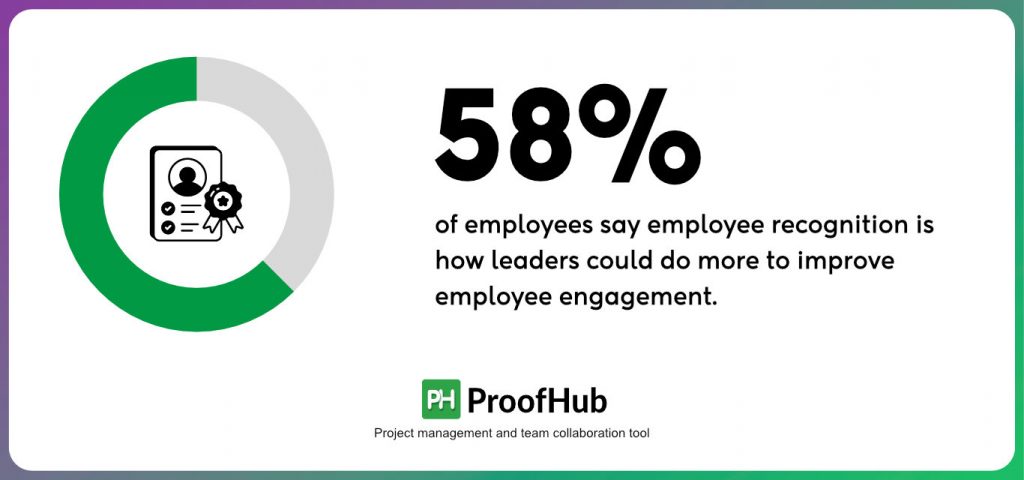
From: Psychometrics, A Study of Employee Engagement in the Canadian Workplace 2010
When employees feel appreciated and recognized at work, they are more likely to develop the connections needed to be engaged. It is far more than a paycheck. Give a shoutout to each employee each day or just a thank you.
- 69% of employees would work harder if they felt their efforts were better appreciated
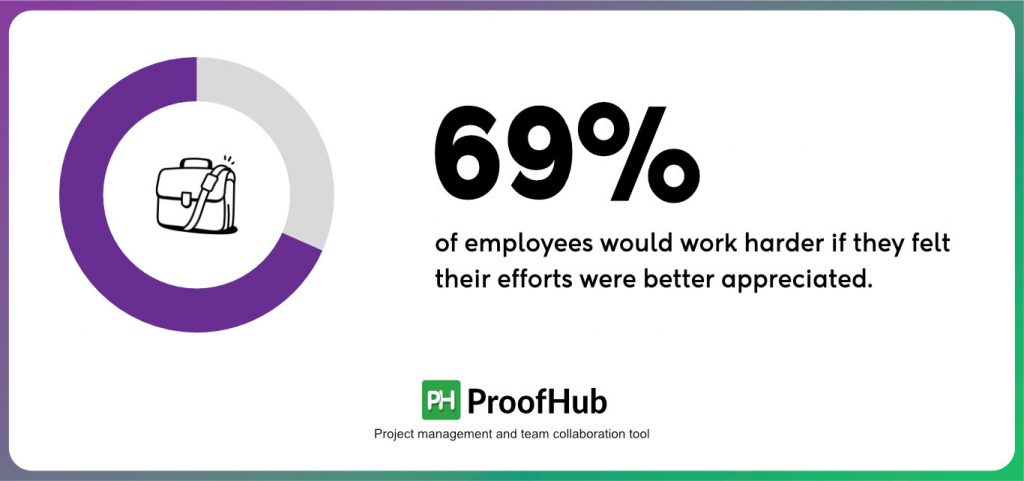
From: socialcast
Show some gratitude for their hard work. Recognition drives productivity. Employees want to get recognized for their contributions. In a Timesjob study, it is revealed that 59% of employees say their bosses don’t show enough appreciation and it makes them feel seriously undervalued. Make them feel they are good at what they do.
- Companies with employee recognition programs have a 31% lower voluntary turnover.
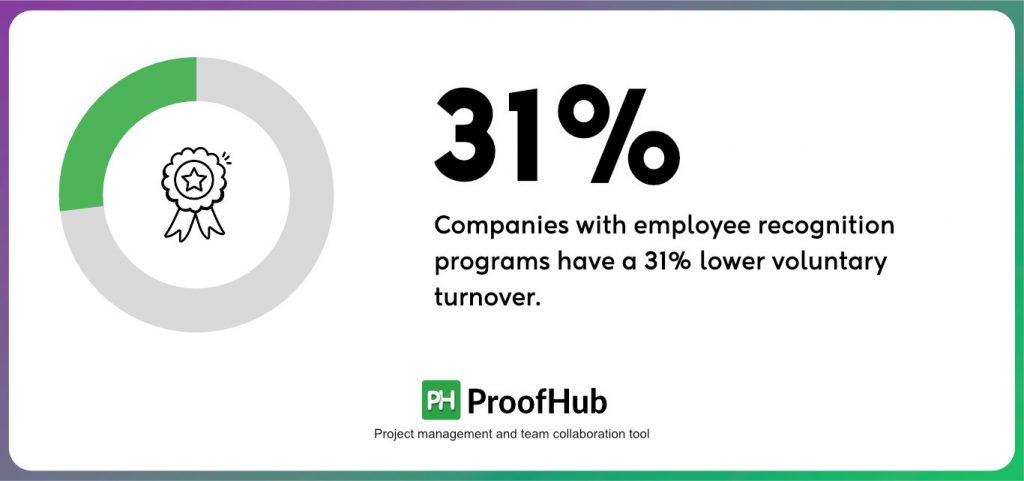
From: Deloitte.com
Employee turnover is something that every manager has to deal with. Job disappointment occurs when employees feel unappreciated. And a little recognition can be the solution to slow down this problem.
Read on: How to create a high performance culture?
Ideas for an Effective Recognition Program
In today’s workplace, an employee recognition program is not just nice to have but critical. Here are things your employees will love:
Public recognition
- Surprise party for your top performers including cakes, confetti, and their favorite music.
- Brag about their achievements on social media.
- Publish the success stories in the company’s newsletter.
- Congratulatory announcement.
Pro tip: An announcement in ProofHub lets you inform, announce, and communicate anything to the entire team in one place.
Private recognition
- Leave a sticky note saying “well done” on their desk.
- Send a box of chocolates to their home.
- Thank you/well done meeting.
- 50% of employees believe being thanked by managers improves the relationship and build trust with their higher-ups.
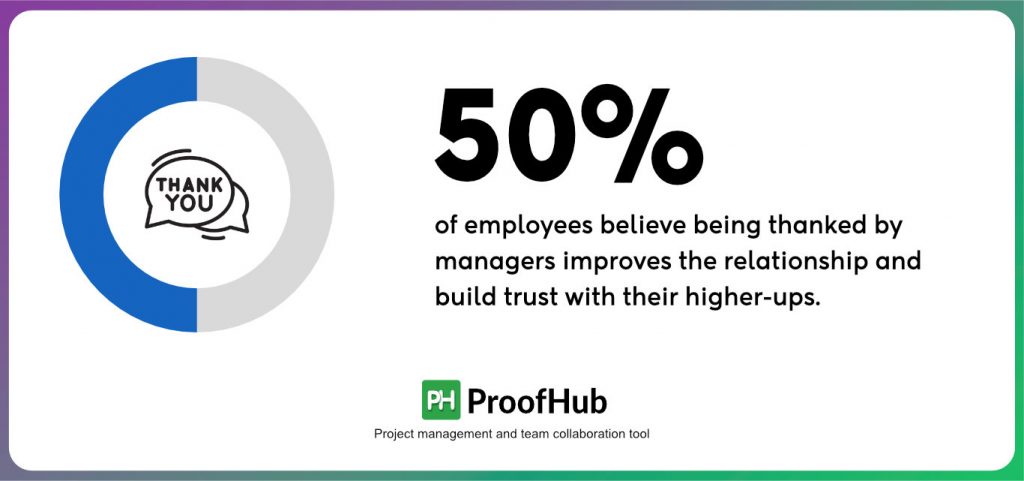
From: Cicero Group
Manager-employee relationships need to be built and developed on trust. And showing gratitude is a way to gain the trust of your employees. Appreciate team for their work. While trust is a two-way street. Let your employees take free control over a project — you’re trusting them to do their job (that’s showing recognition).
- 59% of employees say they’ve been with their current employer for more than 3 years and 22% (among older millennials) have been with their current employer for more than 7 years.
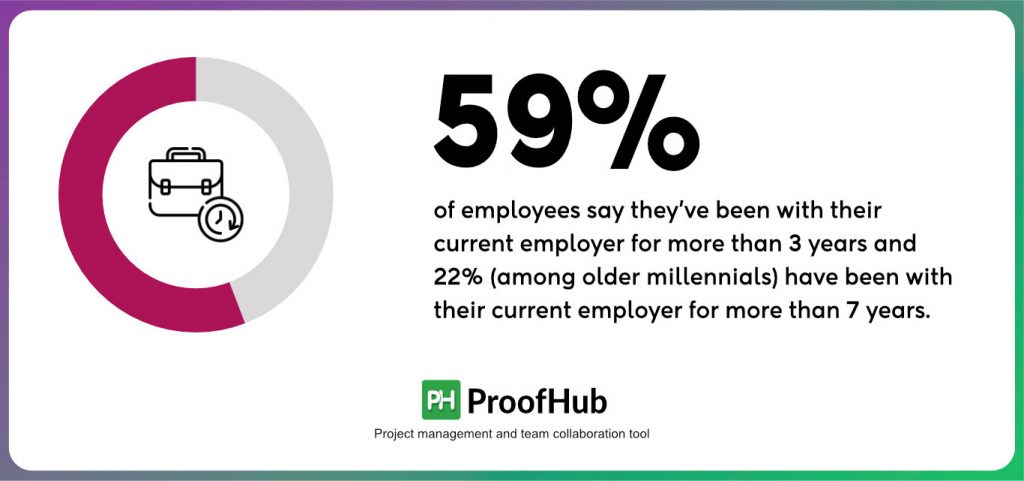
From: Udemy
Happier employees stay for longer with the employer. Employee turnover costs lots of time and money to hire new staff. Making employees feel valued and going beyond the basic needs of employees will certainly boost their hard work.
- 28% of the most memorable recognition comes from an employee’s manager.
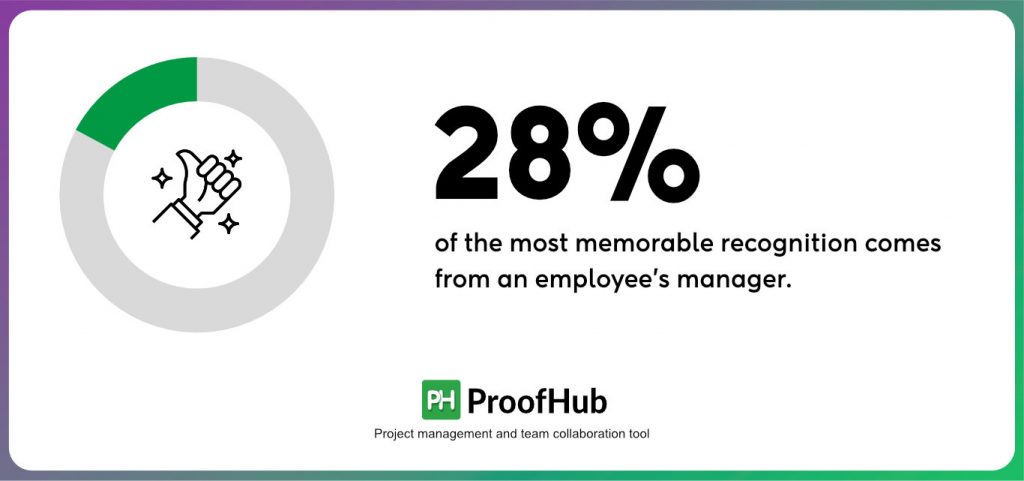
From: Gallup
Managers should always recognize employees as close as possible. Giving feedback matters. If you manage direct reports, plan out your days for the feedback session. Focus on individual achievements or group recognition opportunities.
- 14% of companies indicated that their organization features [recognition] programs regularly when recruiting.
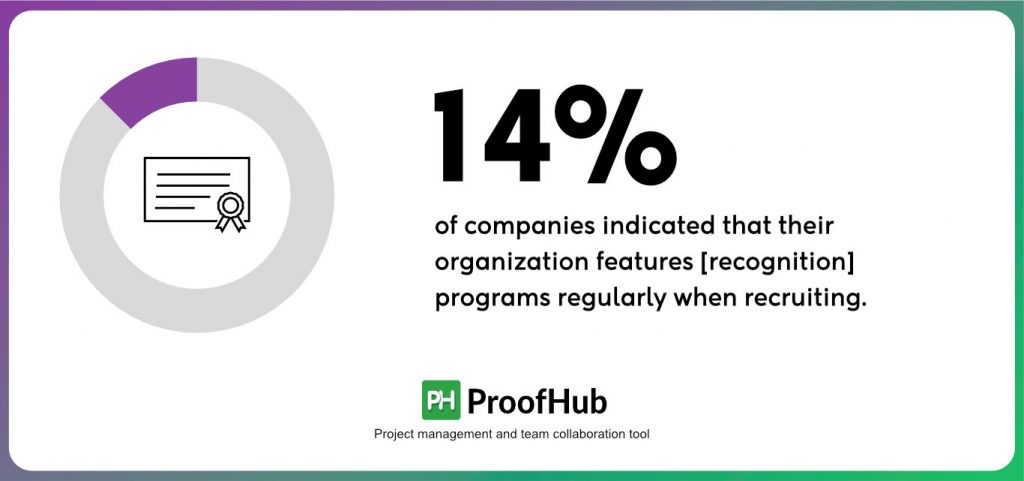
From: worldatwork.org
Let your employees know about your company culture and actively work to incorporate it into the company.
- 90% of employees who work in organizations with effective rewards programs said that “my work makes a difference”.
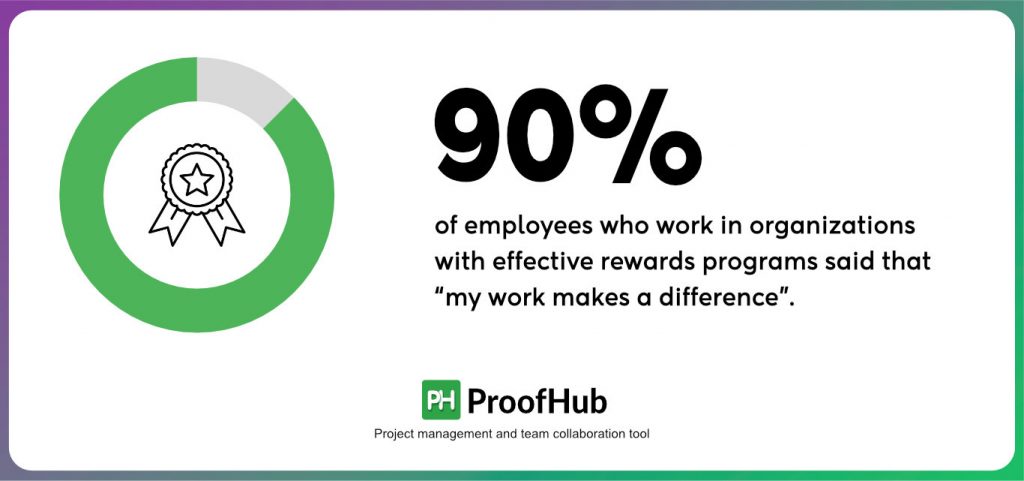
From: AttaCoin
Every generation, especially Millennials and later, are looking for direction. Employee recognition awards and programs make employees realize that they are making an impact.
- 37% of organizations agree that their rewards programs consider multiple generations in the workforce.
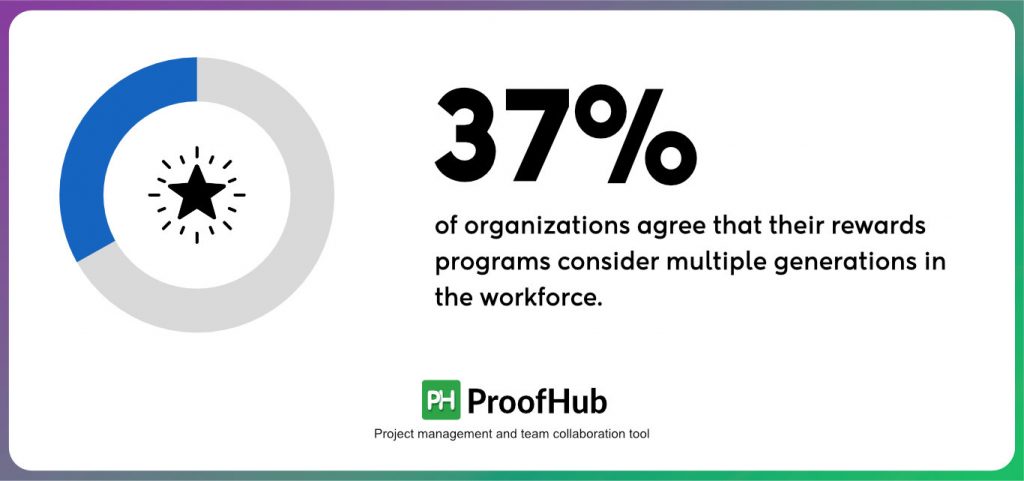
From: The Conference Board of Canada
This indicates that millennials could have an average of five different employers over 10 years. That means, most millennials would not be at an organization long enough to be eligible for most long-service recognition.
Have trouble collaborating with your team? Try ProofHub!
How often do employees deed recognition?
Presently, there is a majority of Millennial workforce in the workplace than any other generation. Millennials have officially passed up Boomers and Generation X and are now the largest generation. Millennial employees need appreciation. They expect their employees’ recognition and real-time feedback. The following employee recognition examples or ideas are a must to make employees feel cherished. Let’s have a look.
Recognition for extra effort and results
This kind of recognition can be used for personal victories and major accomplishments. It brings positive momentum when an employee is witnessed for going the extra mile. When a team member goes above what is expected and you want to recognize extra efforts, gift cards or movie tickets are a great way to show appreciation and deepen work relationships. Otherwise, verbal thanks, emailed thanks, and handwritten notes are always cheap and quick ways to say thanks for everyday effort or merchandise awards to reward noticeable results.
Employee bonus programs
Bonus pay is compensation that is above the basic salary. If your company can afford to pay employees a bonus, follow an employee bonus program to show you value the ongoing dedication and contributions of individuals. A good bonus program should focus on:
- Rewards and retains top performers
- Promote employee’s good behavior
- Increase commitment to goals
There are different types of bonuses to consider: performance-based bonuses for achievement over a specific length of time, i.e. annually, semi-annually, etc., spot bonuses to show immediate recognition for outstanding contributions, sign-on bonuses to attract applicants to join your company, referral bonuses, and any other random bonus.
Recognition for years of service
Do you recognize a person who reaches a specific milestone level in their years of service in your company? You should give it a try. This type of recognition is to celebrate life at work. It gives employees a sense of belonging. They get a better vision to fit themselves into the organization as you spotlight their unique contributions. Create an experience they won’t forget. Choose the right words to use to recognize employees for their years of service. You definitely would want to honor your employees memorably. Right?
Recognition also impacts the 6 essential aspects of workplace culture:
- Purpose
- Opportunity
- Success
- Wellbeing
- Appreciation, and
- Leadership
Jeff Harper, Senior Vice President of People and Culture at MINDBODY, says:
ProofHub Announcements
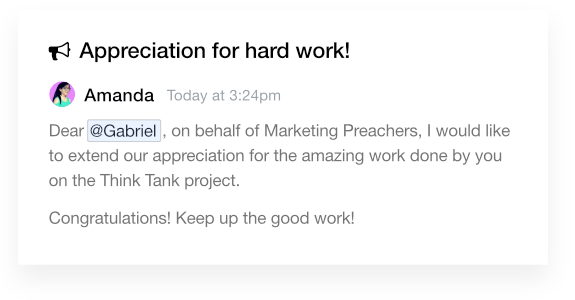
We love ProofHub. It is a go-to communication and collaboration tool, we and other managers use to give recognition. Every time someone is appreciated, the entire team sees it pop in the announcements section on ProofHub. How do you show employee recognition? If you’re using ProofHub, you can find a dedicated space to practice employee appreciation and recognition. Make announcements that grab the attention.
Adding an announcement
- Subscribe people to announcements and choose whom you want to show it and allow to collaborate on it.
- Attach supporting images, files, documents, and more to your announcements.
- Mention someone to address them.
- Use emojis to express without words.
- Select for how long you need the announcement to be there.
So, don’t just wait for the first Friday of March to celebrate your employees rather make everyday ‘Employee Appreciation Day’ for them. #CelebrateWithProofHub to make them feel respected, valued and appreciated for their work.
Explore ProofHub to see if it’s right for your team. Sign up for free!
